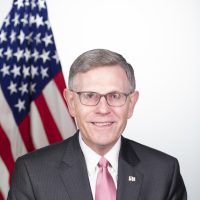In a regional webinar today, Kelvin Droegemeier, director of the White House Office of Science and Technology Policy, urged researchers to be aware of the pervasive threat by some foreign governments to the United States.

The talk, “Enhancing the Security and Integrity of America’s Research Enterprise,” hosted by the University of Tennessee System and Vanderbilt University, was supported by the National Science Foundation. Researchers from institutions in Tennessee, Louisiana, Kentucky and Arkansas participated in the 75-minute event.
“This is an amazing time in American science and technology,” Droegemeier said to the hundreds of researchers attending virtually. “We must protect our values and mitigate the risks.”
With United States research values ranging from openness and transparency to freedom of inquiry and merit-based competition, Droegemeier said inappropriate behaviors either by some researchers or foreign governments jeopardize the integrity of such values. Yet, international collaboration is fundamental to advancing science, he said, mentioning the first image of a black hole, which took 60 institutions in 20 countries to capture.
“Principled international collaboration is very, very critical to success,” he said.
Droegemeier also highlighted that the Office of Science and Technology Policy established the Joint Committee on the Research Environment and a subcommittee to address research security among other research issues. Subcommittee members are developing best practices for universities and other research institutions as well as developing education and outreach materials that highlight examples of risks to research. In addition, they are working on coordinated guidance for agencies and clear recommendations for universities.
“It was our privilege to co-host Kelvin for this conversation with our regional research community,” said Padma Raghavan, vice provost for research and professor of computer science and computer engineering at Vanderbilt University. “We agree that the future of U.S. leadership in basic research depends on fostering international collaboration and attracting the best talent from around the world while simultaneously protecting our research community from the threats of undue foreign government influence.”
Stacey Patterson, UT vice president of research, agreed.
“We appreciate the opportunity to hear directly from our federal government partners regarding important and timely topics,” she said. “Dr. Droegemeier from OSTP and Dr. Keiser from NSF provided useful information to universities throughout our region that will help us address risks to security and integrity while maintaining open and collaborative research enterprises.”